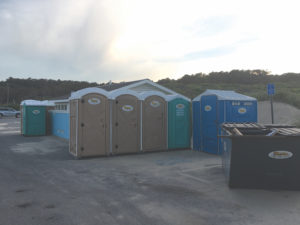
While much of the Cape economy is in the crapper due to coronavirus-related shutdowns and restrictions, porta-potty companies are flush.
That’s because in a summer when Covid-19 has heightened fears about health and sanitation, portable toilets are replacing permanent facilities at many beaches and public areas.
Even if the stand-alone versions have never felt especially inviting, they are easier to clean, according to town authorities and companies who provide the potties.
Gil Ricci, site services manager at Nauset Disposal, which provides portable restroom rentals and services Cape-wide, said their plastic interiors and self-contained configurations make that so.
The cleaning consists of scrubbing with a chemical solution, heated pressure-washing, and now spraying with the medical grade disinfectant BioTab 7, “known to kill, amongst other things, coronavirus,” Ricci said. The disinfectant mist dries almost immediately, he said.
Wellfleet is among the towns renting additional portable restrooms, according to Town Administrator Dan Hoort. The one-at-a-time setup of the portable versions should help people with social distancing, Hoort wrote in an email to the Independent. To clean them, he added, one can “hose it down.”
Companies that provide portable restrooms have the equipment to sanitize them, whereas cleaning permanent restrooms would require more staff hours from beach and recreation employees under Centers for Disease Control guidelines. That’s why the National Seashore won’t open all its restrooms this summer.
Meeting the pandemic-era cleaning requirements imposed by the CDC will come at a cost. But much of that will likely be met through the CARES Act, according to town officials.
Although Hoort won’t have official costs until bids for the portable restroom contract have been opened, he wrote that last year Wellfleet’s contract was for $42,519 and that he expected bids this year could be “five to eight times that amount.”
Provincetown is also adding portable restrooms for the summer, at a cost of $10,051, plus hand-washing stations costing $23,280, according to Leslie Sandberg of Rose, Sandberg & Associates, a media consulting firm hired by Town Manager Robin Craver to speak for town officials on matters related to Covid-19.
If that sum seems relatively small, that’s because, while there is access to the water from Commercial Street and around the pier, most of Provincetown’s beaches are in the National Seashore, Sandberg said, so there are fewer public bathrooms operated by the town.
Truro won’t be getting more portable restrooms but will increase the cleaning of those they already use, along with adding hand-washing stations, according to Beach Director Damion Clements. The cost will be $97,310.45.
Eastham, which manages fewer public beaches than other Outer Cape towns, is keeping permanent restrooms open and providing portable restrooms in other areas. To keep visitors safe, plexiglass has been installed between sinks in bathrooms, according to Town Administrator Jacqui Beebe. In addition to daily cleanings, portable and permanent restrooms will get a weekly “sanitizing, using a fogger.” The additional cleaning will cost about $78,000.
Initially, the National Seashore closed most of its restrooms, opting for portable units at six beaches and two visitor centers, according to Chief of Facilities and Maintenance Karst Hoogeboom.
Since the Seashore already owns the potties, the only additional costs are pumping and cleaning, at $2,400 a week.
By July 2, the Seashore will move into a “more comprehensive bathroom experience” by opening three-quarters of their permanent restrooms for the holiday weekend, Hoogeboom said.
The boom in toilet rentals, increased need for cleaning, and jump in spending around the Cape have helped companies like Nauset Disposal recover some of the losses they faced as the pandemic struck the local economy.
The portable bathroom contracts “softened the blow,” said Tim DeLude, Nauset Disposal’s operations manager.
The company would normally be busy now providing portable restrooms for weddings, soccer tournaments, and holiday events, all of which have been postponed or canceled.
“We were holding on for dear life for a few months,” said DeLude.
The nature of its services gave the company a leg up on sanitation, according to Gil Ricci. “We’ve always had a heightened level of safety,” he said. Handles on pressure washers and brushes are long, as are the extension tubes for the pumps. Workers also wear face shields to protect against “splash ups.”
DeLude said he is grateful that his company has been able to keep providing its services and keep employees working through it all.
Adaptability has been key to staying afloat, DeLude said, “but I think you are seeing that across every business right now.”
The company has started a new service for businesses: hand sanitizer stations. Ricci confirmed rumors of hand sanitizer being stolen from the portable toilets’ dispensers, but said now that sanitizer shortages have lessened, the problem has faded.
And for summer visitors traveling to the Outer Cape, staff at the Route 6 rest stop told the Independent their bathrooms are open, should you need to make a pit stop on the way.
